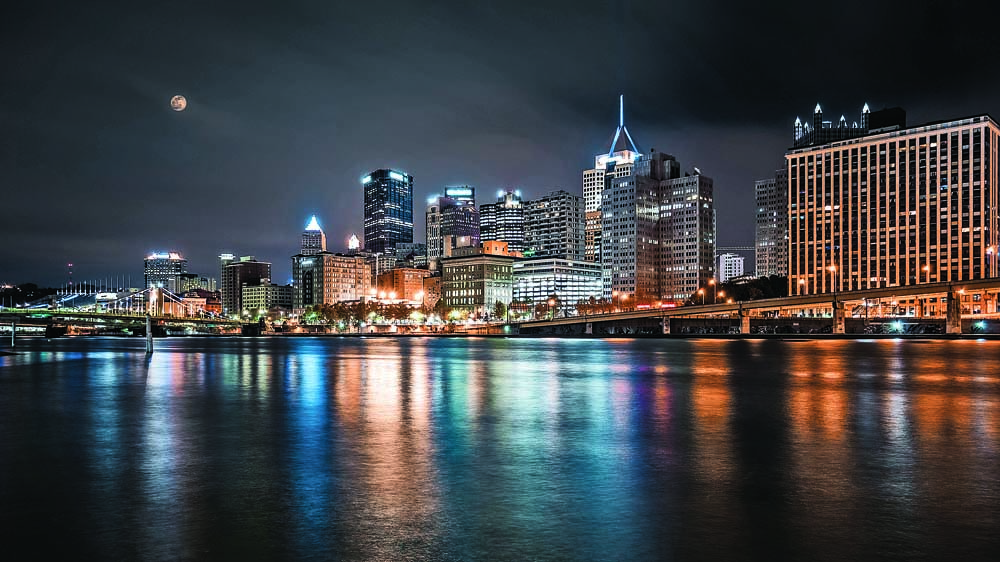Amazon picks 20 finalists for second headquarters
Published 12:00 am Friday, January 19, 2018

- The Pittsburgh skyline by night is viewed from North Shore Riverfront Park across the Allegheny River. (Mihai Andritoiu/Dreamstime/TNS)
SEATTLE — Amazon said Thursday that it had whittled the list of possible homes for its second headquarters to 20, including centers of technology like Boston and some surprise locations like Columbus, Ohio.
Many of the finalists, including Dallas, Denver, Raleigh and Washington, were considered shoo-ins from the moment Amazon announced the search, largely because of the attributes that the company said it was seeking for its second home. Those criteria included a metropolitan area with a population of greater than 1 million and the ability to attract and keep strong technical talent.
More unexpected was Amazon’s selection of locations not typically thought of as tech centers, such as Columbus, Indianapolis, Miami and Nashville, Tennessee.
Los Angeles was the sole city from the West Coast to make the cut.
Just as surprising was Amazon’s rejection of applications from Detroit, Phoenix and San Diego. Although it received bids from regions in Mexico, Amazon narrowed its finalists to just American locations and one city in Canada, Toronto.
Terry McAuliffe, the former governor of Virginia, celebrated the acceptance of his state’s bid in a message on Twitter. “Let’s close the deal and bring it home!” he wrote.
The company, based in Seattle, selected the finalists out of a pile of more than 238 applications submitted by local officials in Mexico, Canada and the United States — all of them eager to attract the 50,000 high-paying jobs the company says it could bring. When the unusual public contest was announced in September, it set off a public charm offensive by the applicants, with many local officials trying to entice Amazon with tax breaks and other benefits.
The process will shift into a new phase, with Amazon representatives communicating more directly with finalist cities as they prepare to select a winner later this year, and perhaps with cities being more outspoken about why they should be chosen.
“Getting from 238 to 20 was very tough — all the proposals showed tremendous enthusiasm and creativity,” said Holly Sullivan, Amazon’s head of economic development.
“Through this process, we learned about many new communities across North America that we will consider as locations for future infrastructure investment and job creation.”
Amazon provided little detail about how it picked the finalists for its second headquarters, which it is calling HQ2, other than to say it based it choices on the criteria it laid out for the search earlier.
According to people briefed on the process who would speak only anonymously because the deliberations were private, the process was conducted by a team of about a dozen people within Amazon, including economists, human resources managers and executives who oversee real estate. Jeff Bezos, Amazon’s chief executive who was the mastermind behind turning the search into a public process and coined the term “HQ2,” was also involved, the people said.
Amazon said in September that it needed a second headquarters because it would soon outgrow its hometown, Seattle. Bezos, founded the company there in 1994, and it has since transformed Seattle, employing more than 40,000 in the city. That expansion has also contributed to the city’s soaring cost of living and traffic woes.
To lure applicants, Amazon showered local politicians with statistics about the effect the company has had on the Seattle economy and some of the immediate economic benefits for its new home, including plans to spend $5 billion for construction of its second headquarters.
It asked candidates to include in their bids a variety of detailed information about the area, including potential building sites, crime and traffic stats and nearby recreational opportunities. And it asked cities and states to describe the tax incentives available to offset Amazon’s costs for building and operating its second headquarters.
The process has also attracted critics. Stacy Mitchell, co-director of the Institute for Local Self-Reliance, a nonprofit organization that serves as an advocate for local businesses, said that local politicians were enhancing Amazon’s image just as the company’s market power was under growing scrutiny from groups like her own.
“As these cities woo and grovel, they are basically communicating this idea that we should want Amazon to be bigger and more powerful in our economy,” Mitchell said.
In an interview before Amazon announced its list of finalists, Ras Baraka, the mayor of Newark, said Amazon, long criticized in Seattle for its role in a booming economy that has displaced lower-income residents and minorities, had an opportunity to make a statement by selecting a less fortunate city for its new headquarters.
“There’s an opportunity to turn the page here and create a new narrative for the company,” he said.






